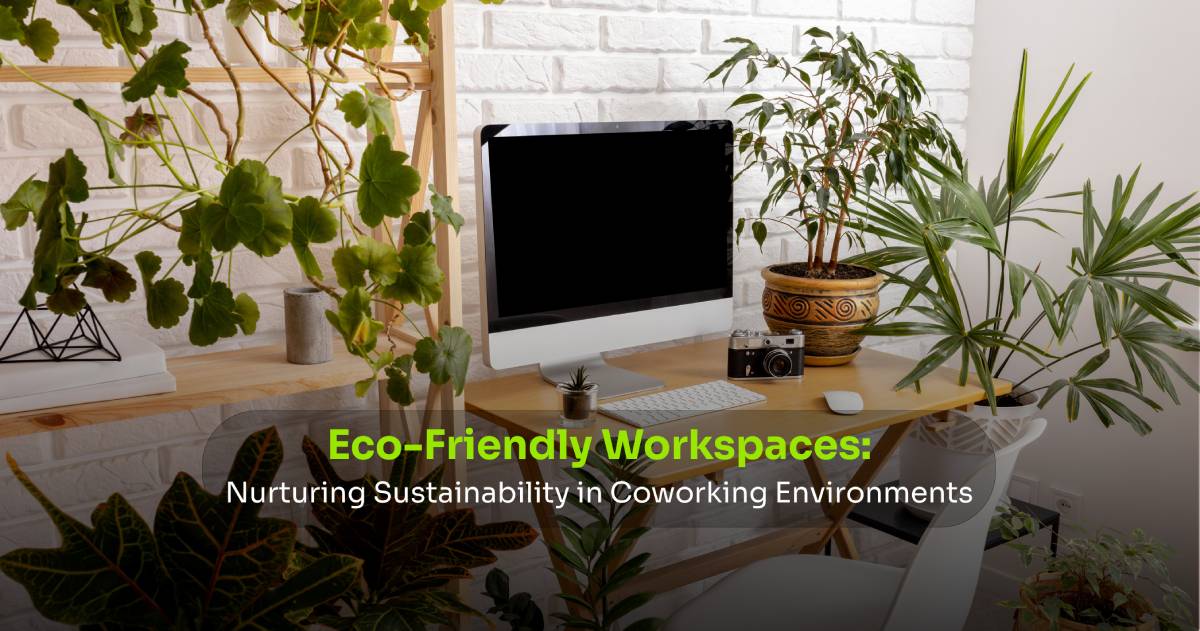We live in an era where environmental consciousness is paramount, and the idea about eco-friendly workspaces has gained significant traction. The intersection of sustainability and coworking environments helps us explore how the adoption of eco-friendly practices is not only a responsibility but also a strategic imperative for businesses. From energy-efficient designs to waste reduction initiatives, coworking spaces are leading the charge towards creating work environments that are not only conducive to productivity but are also environmentally responsible.
The Green Revolution in the Coworking Industry: Coworking spaces have evolved beyond merely shared offices; they have become ecosystems that strive for harmony with the environment. Initiatives such as energy-efficient lighting, water conservation measures, and sustainable materials in construction are at the forefront of this green revolution. The commitment to minimizing the ecological footprint of these spaces resonates with the values of businesses and professionals who seek more than just a place to work – they seek a workplace aligned with their environmental ethics.
Energy-Efficient Designs and Technology: One of the hallmarks of eco-friendly workspaces is the incorporation of energy-efficient designs and technology. From solar panels adorning the rooftops to advanced HVAC systems that optimize energy consumption, coworking spaces are embracing innovative solutions to reduce their reliance on conventional energy sources. These initiatives contribute to a more sustainable future and also position these workspaces as leaders in adopting green technologies.
Waste Reduction and Recycling Programs: Eco-friendly workspaces prioritize waste reduction through comprehensive recycling programs. From paperless initiatives to the segregation of recyclable materials, these spaces aim to minimize their impact on landfills. Coworking environments often encourage a culture of sustainability among their members, fostering a community that actively participates in waste reduction efforts. This collective commitment to responsible waste management adds a layer of environmental consciousness to the coworking experience.
Green Building Materials and Sustainable Construction: The construction of eco-friendly workspaces begins with the right selection of materials that would have minimal environmental impact. Sustainable and recycled materials, such as reclaimed wood, bamboo, and recycled metal, are increasingly used in the setting up and furnishing of such spaces. This commitment to green building reduces the demand for new resources and sets a standard for sustainable construction practices in the broader real estate industry.
Biophilic Design and Indoor Greenery: Beyond tangible eco-friendly features, coworking spaces incorporate biophilic design principles to enhance the connection between occupants and the natural environment. This inclusion of indoor greenery, living walls, and natural light contributes to a visually appealing workspace and likewise improves air quality and employee well-being. The symbiotic relationship between nature and workspaces in coworking environments fosters a sense of balance and sustainability.
Commute Reduction and Sustainable Transportation: Eco-friendly workspaces often encourage alternative modes of transportation to reduce the environmental impact of commuting. Proximity to public transportation, secure bike storage, and incentives for carpooling are common features of sustainable coworking spaces. By promoting sustainable commuting options, these workspaces contribute to the reduction of carbon emissions and align with the global movement towards eco-friendly transportation solutions.
Community Gardens and Sustainable Practices: Some coworking spaces go a step further by incorporating community gardens and sustainable practices within their premises. Rooftop gardens, communal composting initiatives, and the cultivation of herbs and vegetables contribute to the aesthetics of the workspace and also serve as tangible examples of sustainable living. These initiatives encourage members to actively engage in eco-friendly practices, fostering a sense of responsibility towards the environment.
Employee Engagement and Education: Creating an eco-friendly workspace goes beyond physical changes; it involves fostering a culture of sustainability among the workforce. Coworking spaces often organize workshops, seminars, and awareness campaigns to educate their members on the importance of eco-friendly practices. From energy conservation tips to the benefits of a sustainable lifestyle, these initiatives empower individuals to make conscious choices both within and outside the workspace.
Certifications and Green Accreditations: To underscore their commitment to sustainability, many coworking spaces seek certifications and green accreditations. Recognitions such as LEED (Leadership in Energy and Environmental Design) or BREEAM (Building Research Establishment Environmental Assessment Method) serve as external validations of a workspace’s eco-friendly practices. These certifications help boost the environmental credentials of coworking spaces. Through this, appeals can be made to businesses and professionals to prioritize sustainability in their choice of work environment.
Economic Benefits of Eco-Friendly Workspaces: Beyond the moral imperative, there are tangible economic benefits to adopting eco-friendly practices in coworking spaces. Energy-efficient designs, for example, can result in significant cost savings over time. Additionally, the appeal of an eco-friendly workspace can attract businesses that prioritize sustainability in their operations, expanding the client base and enhancing the overall financial viability of coworking spaces committed to green practices.
Challenges and Solutions: While the move towards eco-friendly workspaces is commendable, it is not free of its challenges. Retrofitting existing spaces, cost considerations, and the need for continuous innovation pose hurdles to widespread adoption. However, the industry’s response involves collaborative solutions, such as green financing options, partnerships with sustainable suppliers, and the continuous integration of emerging technologies to address these challenges.
The Future of Eco-Friendly Coworking: As businesses and individuals become increasingly conscious of their environmental impact, the demand for eco-friendly coworking spaces is poised to rise. The future of coworking lies in a seamless integration of sustainability into the very fabric of these environments. From smart energy management systems to circular economy principles, these spaces are set to become pioneers in redefining the workplace as a hub of productivity and environmental responsibility.
Eco-friendly workspaces represent a paradigm shift in the way we conceptualize and design our places of work. Coworking environments, by embracing sustainability as their core, fulfil a moral responsibility towards the planet and also align with the values of a new generation of professionals and businesses. The fusion of innovative designs, green technologies, and a community-driven approach positions eco-friendly coworking spaces as trailblazers in the pursuit of a harmonious coexistence between human productivity and environmental preservation. As the global movement towards sustainability gains momentum, these workspaces stand as beacons, illuminating a path towards a more eco-conscious future for the world of work.







